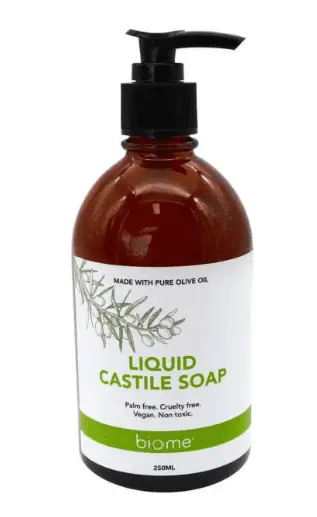Unlocking the Magic of Castile Soap – A Full Guide
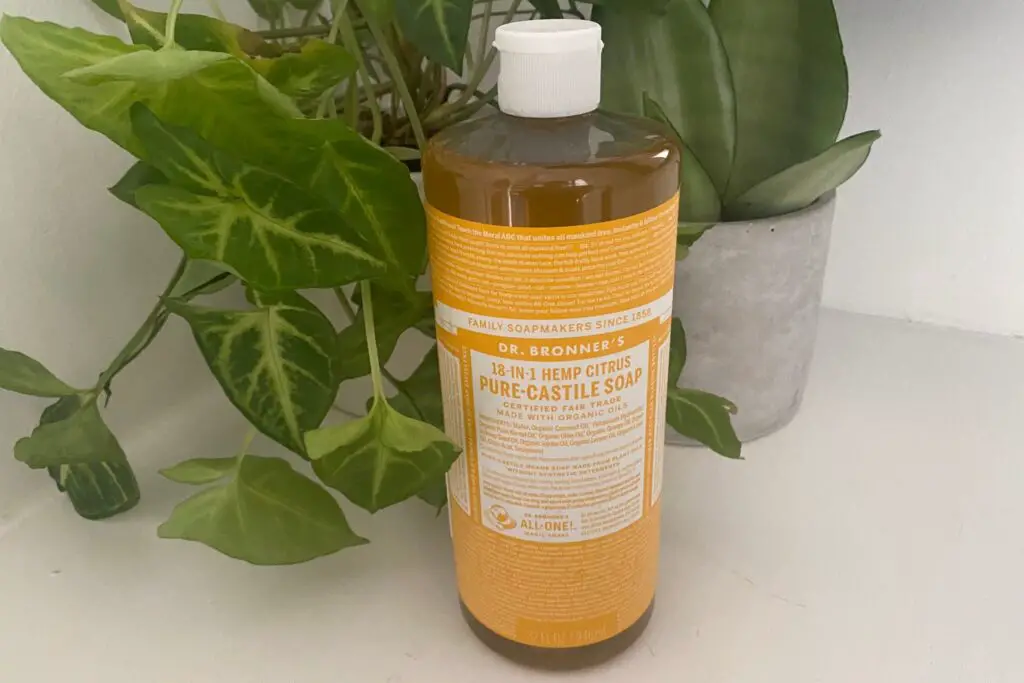
This post was last updated in 2023
Hello there my eco-conscious warriors 😊
I have to tell you, it frustrates me to no end to see the insane range of cleaning products out there. It maddens me to think that we have been led to believe that we need specialised cleaning products for what is essentially one task – remove dirt and grime from a surface.
General household cleaning is not rocket science and it does not require an arsenal of products.
I know because I have ditched my multiple cleaners for one product – castile soap. And I haven’t looked back.
In this blog post, I cover the many uses of castile soap – from household cleaning to personal use.
You’ll find a handy table summarising all the different uses and the dilution ratio needed (that’s very important!). You’ll also find information on how cost-effective castile soap can be.
In particular, I cover the following topics:
And provide some quick answers to the following questions:
Let’s get into it 🚀
1. Castile soap in Australia
Castile soap is crafted from plant-based oils, with olive oil being the most common ingredient. In Australia, castile soap can be a challenge to find. You can find it at Woolworths, David Jones and specialty stores. And of course, it is available online – both the liquid and bar form.
It is worth seeking out as there are so many uses you can get out of this one product (more on that below).
And it is worth it also because it is environmentally friendly and low-tox. It ticks many boxes.
Castile soap has its roots in the Castile region of Spain, where the soap was once made from olive oil alone.
Nowadays castile soap is made from a collection of oils, all of which have been saponified (turned into soap) so that when you mix it with water, it creates a lather.
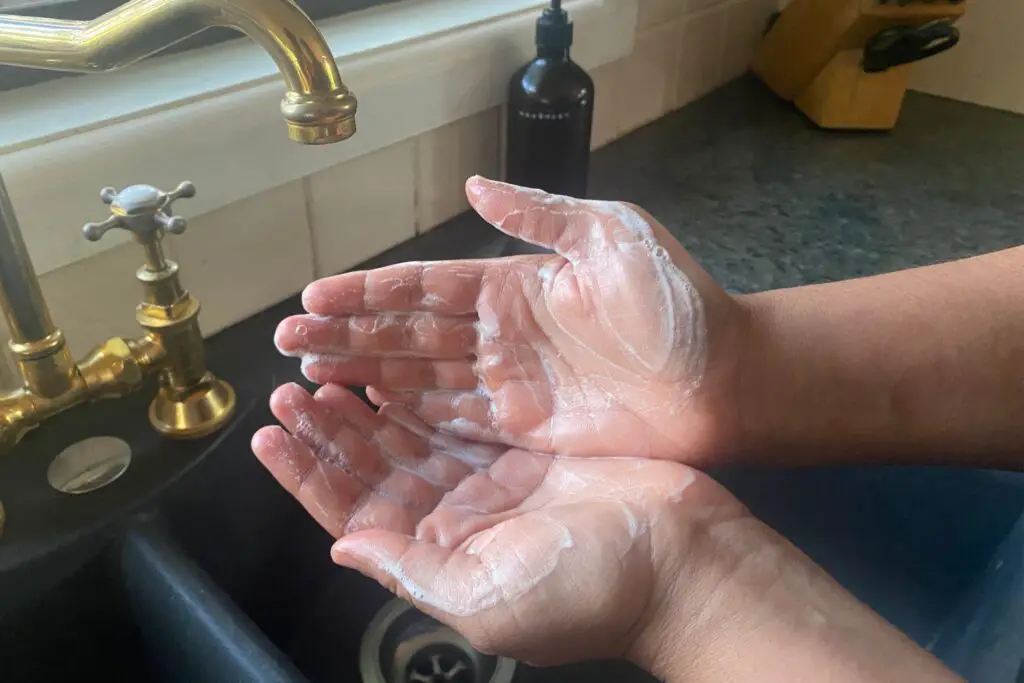
It’s purely vegetable-based, as opposed to the animal-based cleaning products found in supermarkets (most cleaners are produced using animal fats).
Castile soap works well as a cleaner as it has a high pH, so it is highly alkaline. Alkalines are great at lifting grease off surfaces because grease is mostly acidic and alkalines neutralise acids. Castile soap is up there with baking soda, which has a pH of around 9.3.
Castile soap is non-toxic, antibacterial, anti-fungal, antioxidant and 100% biodegradable.
It comes in both liquid and solid (bar) form.
And castile soap multi-tasks like nothing else – saving you time, energy, money and storage space.
But as I said, it is a little bit difficult to find. You probably won’t find it on supermarket shelves. For example, the castile soap Coles sells is not true castile soap (more on that below) while Woolworths sells two brands of castile soap – Biome and Melrose. While you can purchase these online from Woolworths, they can be difficult to find in-store (at least in my experience).
But it’s not impossible to find.
When I need castile soap, I buy the Dr Bronner brand from David Jones. Nice and easy.
Specialty stores also sell castile soap, for example as bulk food stores like The Source Bulk Foods.
Finally, it can always be ordered online from various places (Biome is my favourite eco-friendly online store so check that out and it is avaiable on Amazon).
2. Why castile soap is amazing
Castile soap is amazing because it’s non-toxic, antibacterial, anti-fungal, antioxidant and 100% biodegradable. And it has so many uses as a cleaner for your home and body. It’s gentle on the skin, eco-friendly, all-natural, and economical. Available as liquid or bar soap, castile soap is so versatile.
Here are the benefits and some uses:
Eco-Friendly
Castile soap is biodegradable, ensuring it does not harms plants or animals when it gets in contact with the environment. As many brands making castile soap focus on using sustainably sourced plant-based ingredients, it makes castile soap a top choice for those dedicated to reducing their environmental impact.
But it is important to buy from a reputable brand or check the ingredients list to ensure the ingredients are sustainable sourced and will not do harm to the environment at the end of its life.
More information on different ingredients used and what to look out for is discussed further below.
All-Natural
With no synthetic additives, detergents, or harsh chemicals, castile soap is as pure as it gets. It’s a gentle and wholesome way to clean and care for your home and body, ensuring you live a chemical-free lifestyle.
Again it is important to check the ingredients list on any product. More information on ingredients is provided below.
Gentle on the Skin
Castile soap is incredibly mild and suitable for all skin types, including the most sensitive ones. It can be your go-to body wash, hand soap, and even the secret ingredient for crafting your own luxurious foaming facial cleanser.
Versatile
A bottle of castile soap is the ultimate multitasker. It effortlessly tackles a wide array of cleaning chores around your home, from dishes and floors to countertops and even pet grooming.

Concentrated Power
One of the remarkable features of castile soap is its incredible concentration. A little goes a long way, making a single bottle last for months, saving both your wallet and the environment.
So let’s into some specifics…
3. Cleaning with castile soap
Liquid castile soap and castile soap bars are the ultimate cleaning chameleons. Here’s a glimpse of the different ways you can use these products:
Body and Face
You can use it as a shower gel, hand soap, or even as a gentle face wash.
Home Surfaces
Dilute castile soap with water to concoct an all-purpose household cleaner. Ideal for cleaning kitchen counters, bathroom tiles, floors, windows, and various surfaces throughout your home.
Dishes
Mix a few drops with water to create a superb liquid dish soap that effortlessly tackles grease and grime, making your dishes sparkle.
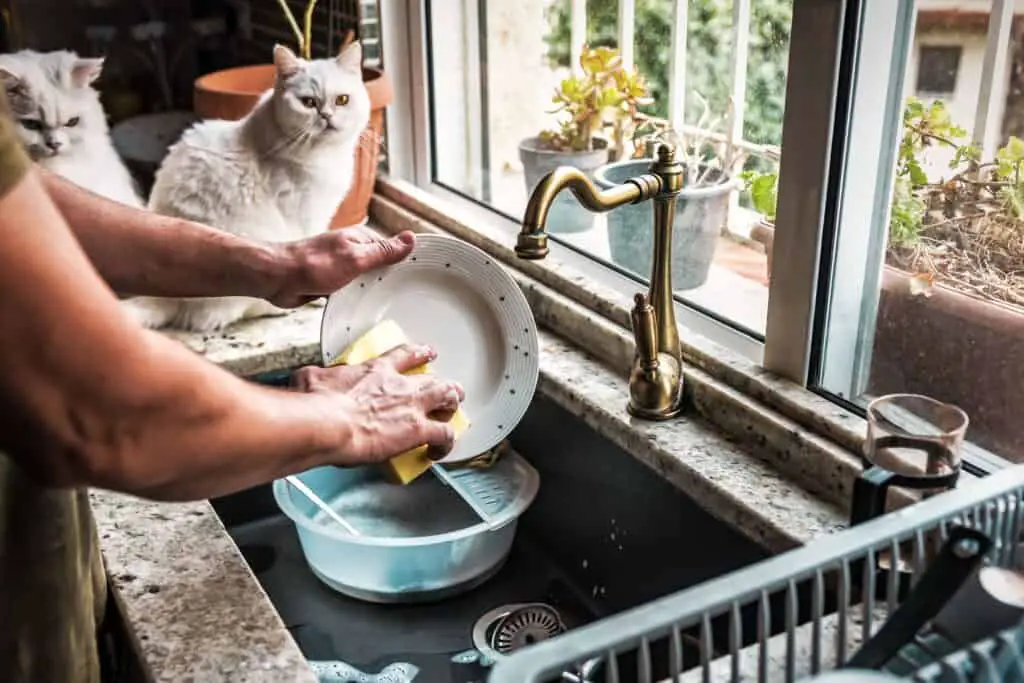
Laundry
Enhance your laundry experience by using castile soap, whether in liquid or bar form. It helps banish stains and leaves your clothes feeling fresh and clean.
Pets
Treat your furry companions to a spa day using castile soap as a gentle pet shampoo. I’m told it’ll leave their coat clean, shiny and soft.
Plants
Diluted castile soap doubles as an effective insect repellent and plant cleaner, ensuring your green babies stay healthy and vibrant. It is particularly useful for deterring aphids.
Fruit and vegetable wash
It’s safe to use to clean your fruit and vegetables, washing off any of the nasty chemicals and debris that may remain on the skin. TO use it as a wash, add some castile soap to a bowl of water or a sink filled with water, put in your produce and give it a wash. Rinse it clean in clear water.
Personal Care
Some use castile soap as a gentle and skin-friendly shaving cream. You can also use it as toothpaste – but it does taste like soap!
It is very concentrated so you do need to dilute the product – or as it says on the packaging for Dr Bronner castile soap: Dulite! Dulite! Ok!
For a full list of different uses and the dilution rates that have worked best for me, see the table below:
Source: https://www.lisabronner.com/dilutions-cheat-sheet-for-dr-bronners-castile-soap/ and based on personal use
These dilution rates are based on using the Dr Bronner brand. It should work well for other brands as well.
Dilution is important, to avoid some of the complaints people have about castile soap (see below).
And dilution is what makes castile soap so economical to use.
More on how I use castile soap…
I use Dr Bronner’s Pure Castile Liquid Soap as an all-purpose cleaner for all areas of the home and for mopping both wooden floors and tiles. I also use it as a hand wash.
The best is seeing it work on my stovetop – after a really messy cooking session, the castile soap makes light work of cleaning up (I am aware of how cliche that sounds).
However, I never liked using it for personal grooming. Once diluted, it can get watery. This makes it hard to handle as a shampoo and body wash.
I do use it as a handwash and get secret pleasure out of watching guests be completely perplexed when the watery soap pumps out of the bottle. I know that doesn’t sound ideal but it’s not as bad as it sounds and it works perfectly fine!
I can not recommend it enough as an all-purpose cleaner – I need nothing else. It’s simplified my cleaning routine.
4. Disadvantages associated with castile soap
Some downsides people mention about castile soap include its initial cost, the residue it can leave behind and the fact that it can not be used on delicate surfaces like marble. Also, it may not suit people with very specific allergies. These downsides can be avoided with proper use.
Let me explain.
Cost
High-quality castile soap may initially seem expensive, but it’s important to note that a little goes a long way, making it cost-effective in the long run.
Let’s take the brand I clearly use:
- 946 mL of Dr Bronner liquid castile soap will set you back $39.95. When diluted for cleaning this leads to 9,460 mL of product or 9.46 L. Per litre cost is $4.22.
- An all-purpose spray costs around $3.50 for half a litre. Its per litre cost is $7.
Castile soap wins out.

And the same argument can be made for so many other uses.
Except if you plan to use castile soap as a laundry liquid. I have to admit, as a laundry liquid, it can get quite expensive!
Residue
Castile soap is highly concentrated and if you don’t dilute it enough, it can leave a subtle residue on surfaces or skin.
You will need to use the dilution rates noted in the table above to avoid this. The dilution doesn’t have to be exact – dilution, in general, will eliminate this issue.
If you find there is residue left behind, it should be easy enough to rinse or wipe clean with water. It won’t take too much scrubbing to get rid of it.
Surface Compatibility
Castile soap’s alkaline nature may not be suitable for all surfaces, like delicate materials such as marble. It’s wise to perform a patch test in a hidden area before widespread use.
Personal Allergies
While castile soap is gentle, individuals with allergies or sensitivities to specific plant-based oils may experience skin reactions. Always check the ingredients list and to be safe, perform a patch test on a small area of skin if you have concerns.
While castile soap offers countless benefits, it’s essential to be aware of these potential drawbacks when incorporating it into your daily life.
5. The main ingredients in castile soap
The traditional ingredient in pure castile soap is olive oil. However, more recently castile soap has come to mean any soap made with plant-based oils including coconut, hemp, jojoba oil and essential oils (which are often added as a scent). But olive oil is usually the main ingredient.
The ingredients in castile soap span across a spectrum.
At one end you have something like the castile soaps sold in Coles. I mentioned above that Coles sells castile soap, but it is not true castile soap.
The product they sell is Beach Road Naturals castile body bar. Here are the ingredients you will find in this bar:
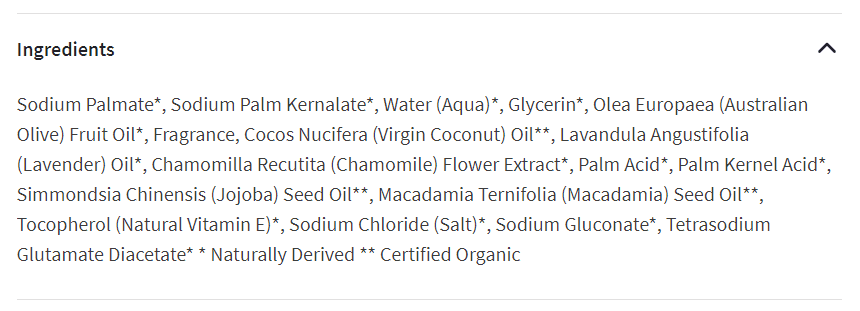
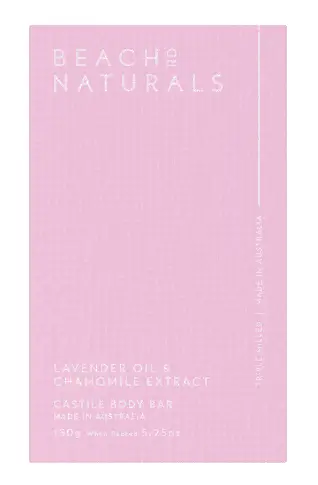
While all are plant-based, many of the organic compounds listed are not oils, for example glycerin, palm acid, palm kernel acid, vitamin E, salt, sodium gluconate and tetrasodium glutamate diacetate.
Some of these are natural derivatives of the oils used in making the soap, but others are organic compounds added to the soap.
That doesn’t make the soap a bad or harmful product – it’s just stretching the boundaries of the meaning of “castile soap”.
In the middle, you have something like Dr Bronner Castille soap. They have scented products with ingredients similar to those list below:
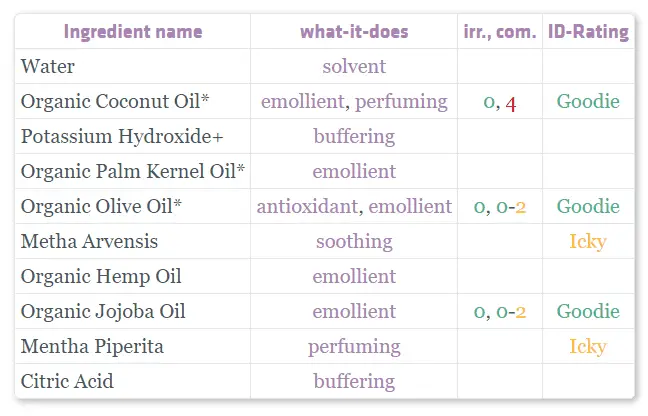
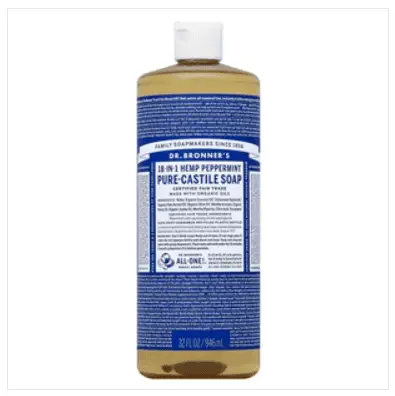
I got this list from incidecoder.com, which provided the assessment scores you see in the image.
As you can see, there are one or two ingredients in there that are not oils, mainly used for “buffering” (used to stabilise the pH level). And there are some plant-based ingredients that are used to add scent (metha arvensis and mentha piperita, which apparently is “icky”. Check out this link if you want to know more).
Dr Bronner’s pure castile soap has an unscented version without the added perfumes:


That’s in the middle. And then you have brands that use nothing but oils. Dr Planet castile soap is one such product, which I discovered when researching for this blog post.
Here is a list of the ingredients they use:
Saponified Victorian Extra Virgin Cold Pressed Olive Oil, Castor Oil, Coconut Oil, Water, Salt.
That’s it.
I will be testing out this brand for sure.
What may be of concern to some is the fact that some brands use palm oil in their soaps.
Palm oil is a popular soap ingredient due to its ability to harden a soap bar without causing the feeling of dryness on the skin afterwards.
Pal oil is of concern because the production and harvesting of palm oil has been assciated with massive habitat and rainforest destruction. This got a lot of media coverage several years ago and there are many people that stay clear of any products that use palm oil.
Myself, I am not one to avoid palm oil completely. But I do check the ingredients list or the companies website to ensure the palm oil used is certified organic and fair trade, or minimally RSPO certified (certified by the Roundtable on Sustainable Palm Oil ).
So yes, I use Dr Bronner’s pure castile soap and yes they use palm oil. They use organic and fair trade certified palm oil, which goes beyond what RSPO ensures in terms of sustainability, so I am happy with this choice.
Here’s a video on the palm oil that this brand uses:
And a blog post if you want further information: https://shop.drbronner.co.uk/article/palm-oil-explained.aspx
You could dismiss this as corporate spin, but I urge you to view or read this with an open mind.
And keep in mind, the production of any source material can harm the environment – palm oil isn’t the only evil out there. If deforestation and land clearing are issues you feel very strongly about, the focus can not be on avoiding palm oil alone. It is about ensuring all source materials that go into the products you use are sustainably, and preferably ethically, made.
For me, Dr Bonners fulfils this brief.
Dr. Bronners has been around 150 years and they produce a solid product. Ethically sourced. Certified organic. The company is family-owned and when you look into it, you can’t help but be really impressed. They are a company with strong values and they operate under those values.
In conclusion, castile soap is a fantastic addition to your eco-friendly, all-natural lifestyle. It’s versatile, gentle, and an excellent choice for those looking to reduce their environmental impact.
So I urge you to grab a bottle of castile soap and start exploring the world of eco-conscious cleaning and self-care!
For some other cleaning tips check out the blog posts I have on vinegar, soap nuts and gumption for some surprising facts and interesting uses.
I’ve tried and tested so many options over many, many years and have hit upon things that work. And it’s important to consider more sustainable options as it is through these conscious choices, we can collectively work towards a more sustainable future 🌎
xxx Tahsin
FAQ
Is Castile soap 100% natural?
Yes, Castile soap is considered 100% natural. It’s made from plant-based oils and does not contain synthetic additives, detergents, or harsh chemicals. However, it’s essential to check the specific brand and formulation to ensure it meets your natural product standards.
What is the difference between regular soap and castile soap?
Traditional soap, often referred to as “commercial soap,” is usually made with animal fats or synthetic chemicals. Castile soap, on the other hand, is an all-natural soap made from plant-based oils, with olive oil being the classic choice. Castile soap is gentle, eco-friendly, and versatile, while regular soap can be harsh and contain synthetic additives.
Can I wash my clothes with castile soap?
Yes, you can use Castile soap as a laundry detergent. Simply add 60 – 120 mL to your washing machine or hand wash your clothes. It’s particularly useful for individuals with sensitive skin, as it lacks the harsh chemicals found in some commercial laundry detergents.
What does Castile soap do to bugs?
Castile soap can be used as an insect repellent. When diluted with water and applied to plants, it can help deter common garden pests such as aphids, spider mites, and other small insects. The soap disrupts the insects’ cell membranes, making it difficult for them to breathe, and they subsequently leave the treated area.
A Heads Up: This posts contains affiliate links that may earn me a small commission at no additional cost to you. Also as an Amazon Associate, I earn from qualifying purchases. I only recommend products and services that will help you take steps towards a more sustainable life and will never recommend anything that does not align, in some way, with these values.

